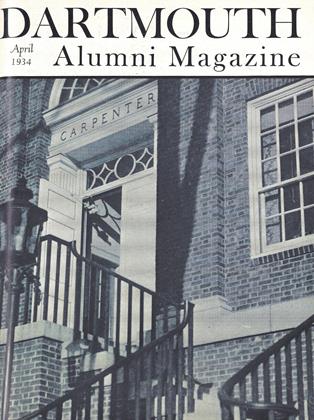The liberal college as the alumni knew it is slipping away. Its traditional sort of activity, whether at Dartmouth or at any other institution of its kind, is being repudiated more and more.
The college reaches back into ecclesiastical and distinctly upper-class forms and feelings: it has traditionally acted upon the assumption that our society is good and that the business of leisured people is to appreciate its best products. The usual professorial mind accordingly has employed its energy to study, to appreciate and to relay appreciation, without feeling it imperative to take a stand. After all, what stand was it necessary to take when agreement on the basic soundness of our civilization was all-pervasive? No fundamental stand, obviously, but only decisions as to the merits of this particular cultural product as distinct from that particular product. Or, again, this or that might be awry, this or that might in the name of realism and principles demand a courageous overhauling, but that did not mean that the real essentials of our social order were faulty.
And this feeling of course still persists among most of our professors, undergraduates, and alumni. Look beneath the democratic liberalism on the surface and you find that, whether they openly celebrate our basic mode of life or prefer to speak impartially about it, they are indubitably apologists for it. It is thus only reasonable to ask what prompts this talk of repudiation. How is the traditional activity of the liberal college being repudiated?
Clearly, it is being repudiated by events.
The most striking and incontravertible event is the failure of capitalism. In its literature as in its religion, our culture has shown increasingly unmistakable decay. And at last the failure of the basic economic mode, the deepening of crisis and the tendency, in America and elsewhere, towards fascism and war have wrecked the old assumption that our society is a good one.
In contradistinction, therefore, to the majority who try to retain this assumption, an extending group in the colleges is resisting it as untenable. They know very well that the crisis in economic life and the crisis in culture, far from being unfortunate accidents that happen to have damaged contemporary life, are the direct and inevitable results of capitalist economic thought and practice. They realize too that their victimization, if it has not already begun, is so imminent that they cannot afford to luxuriate in that eternal suspension of judgment, that unwillingness to take a definite stand against capitalist society, which a large proportion of the academic world exhibits and advises.
At Dartmouth they have seen their experience powerfully expressed in Orozco's fearless frescoes and they have not been reluctant to express themselves, however weakly by comparison or by any standard, in Steeplejack. As they increase in strength and clarity, as more and more of them are torn from their old world by raw events, the activity of the college will go further and further beyond the old activity: of relaying the best that has been thought and said. To answer the challenge which already exists, a more exact preparation will have to be devised. For until an international communal order is achieved, the worth of the college will be tested by the number of radicals it contributes to society.
Editor, The Steeplejack.
 View Full Issue
View Full Issue
More From This Issue
-
 Class Notes
Class NotesClass of 1918
April 1934 By Allan C. Gottschaldt -
 Article
ArticleHANOVER BROWSING
April 1934 By Rees H. Bowen -
 Class Notes
Class NotesClass of 1910
April 1934 By Harold P. Hinman -
 Class Notes
Class NotesClass of 1908
April 1934 By Laurence W. Griswold -
 Class Notes
Class NotesClass of 1930
April 1934 By Albert I. Dickerson -
 Class Notes
Class NotesClass of 1923
April 1934 By John C. Allen








